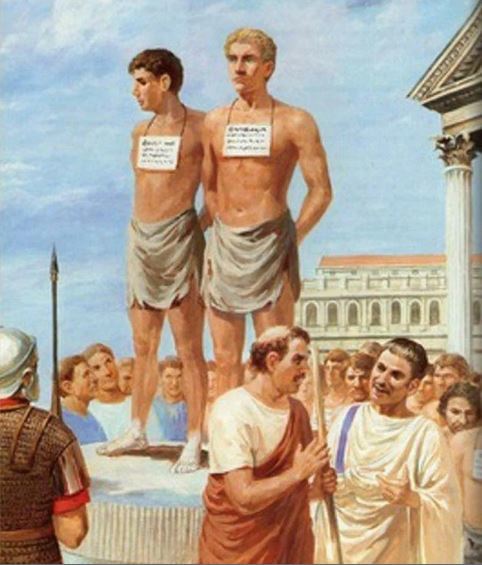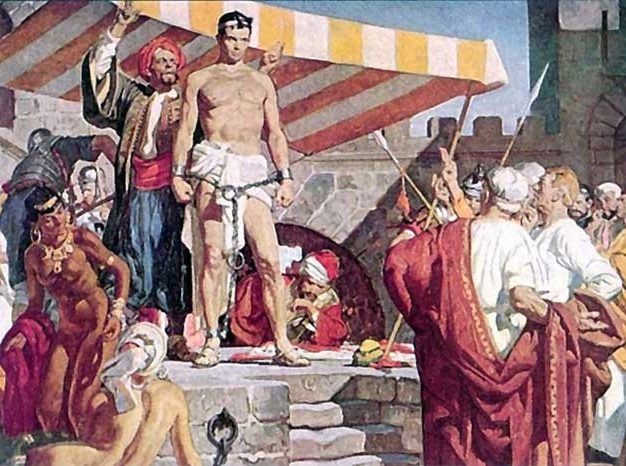Slave Uprising in Sicily
The First Sicilian Slave Revolt was an uprising of slaves on the island of Sicily that occurred between 135 and 132 BC. The revolt was led by a former slave named Eunus, who was proclaimed king by the rebels. His chief military commander was a Cilician named Cleon. The insurgents achieved several victories against Roman forces, but were ultimately defeated by a large Roman army that was dispatched to the island.
By the mid-2nd century BC, the concentration of slaves in Sicily had reached significant levels. The situation on the island was marked by the near-total absence of small free landowners, the prevalence of large slave-run estates, and the extremely harsh conditions faced by the slaves, particularly those working in agriculture. This was further exacerbated by the fact that slave owners neglected even the basic needs of their slaves, such as food and clothing, leaving them to fend for themselves. As a result, banditry and robbery became rampant on the island. The Roman authorities, unwilling to conflict with the powerful Sicilian slaveholders, took no measures to improve the situation.


One of the factors contributing to the outbreak of the revolt was the relatively homogeneous ethnic composition of the Sicilian slave population, many of whom were Syrians.
The uprising began in the city of Enna. Approximately 400 rural slaves belonging to a man named Damophilus gathered outside the city under the leadership of a Syrian slave named Eunus. After performing sacrifices and taking oaths, they stormed the city, where they were joined by local slaves. The rebels massacred nearly the entire free population, sparing only the weaponsmiths and a few slave owners who had treated their slaves with relative kindness. At a meeting of the rebels, Eunus was proclaimed king under the name Antiochus, and his wife was made queen.
The successful revolt in Enna triggered similar uprisings across Sicily. A second major center of rebellion emerged in Agrigentum, where a former Cilician pirate named Cleon gathered a force of 5,000 men and took control of Agrigentum and the surrounding region. At the early stages of the revolt, the slave owners hoped that the two leaders of the rebellion would turn against each other, but this hope was in vain. Cleon submitted to Eunus, becoming his chief military commander.
Praetor Lucius Hypsaeus, leading an army of 8,000 men, was dispatched to suppress the rebels, but his forces were defeated by the insurgents. This victory accelerated the spread of the revolt. Soon, the number of rebellious slaves exceeded 100,000. They occupied nearly all the major cities in the central and eastern parts of the island, including Enna, Agrigentum, Tauromenium, Catana, and Messana.
As a result of these events, a genuine slave state emerged in Sicily, led by King Eunus-Antiochus, who issued coins bearing his name and title. The rebels did not harm small landowners, thus preserving the island's productive capacity. The large scale of the revolt forced the Romans to send their main consular armies to Sicily. In 134 BC, the consul Gaius Fulvius Flaccus acted against the rebels, in 133 BC the army of Lucius Calpurnius Piso Frugi approached Enna, and in 132 BC Publius Rupilius laid siege to Tauromenium.
The slaves put up fierce resistance; however, famine began to take its toll in the besieged cities, weakening the defenders. Due to the betrayal of one of the slaves, the Romans were able to capture Tauromenium. During a sortie near Enna, Cleon was killed, and soon after, the main city of the rebels fell. Eunus was captured by the Romans and died in prison.
News of the large-scale revolt in Sicily spread widely across the Mediterranean, indirectly causing other conspiracies and slave uprisings. Later, another major slave revolt occurred in the Roman Republic, which became known as the Spartacus Rebellion.



